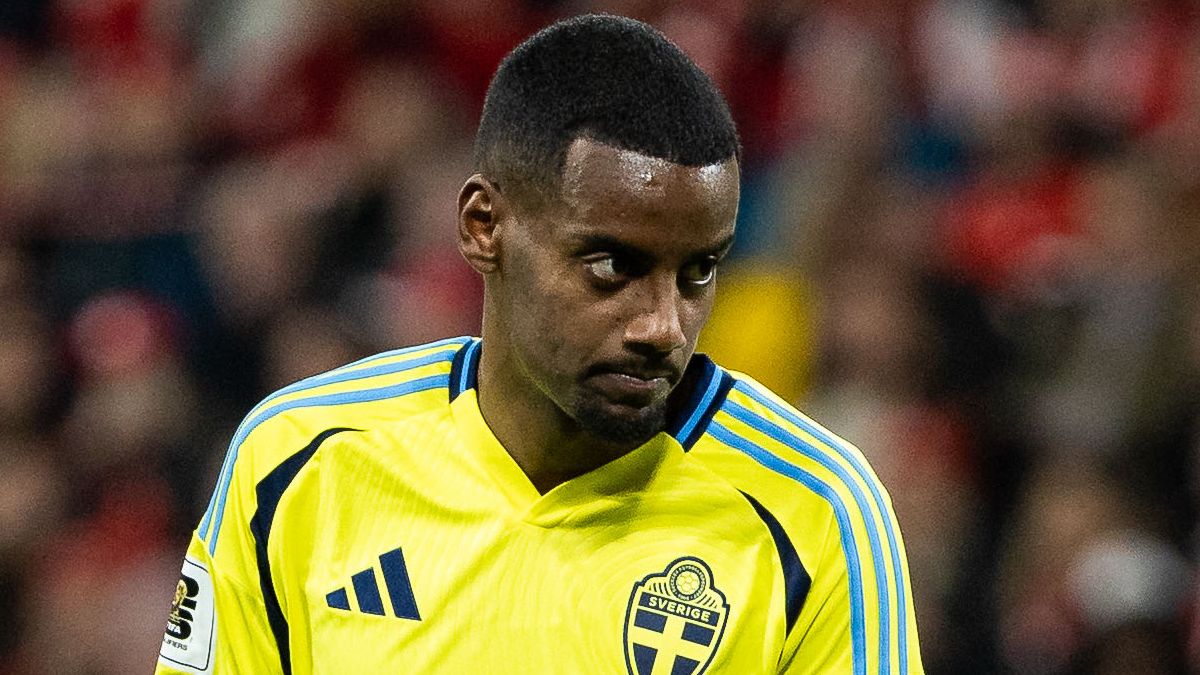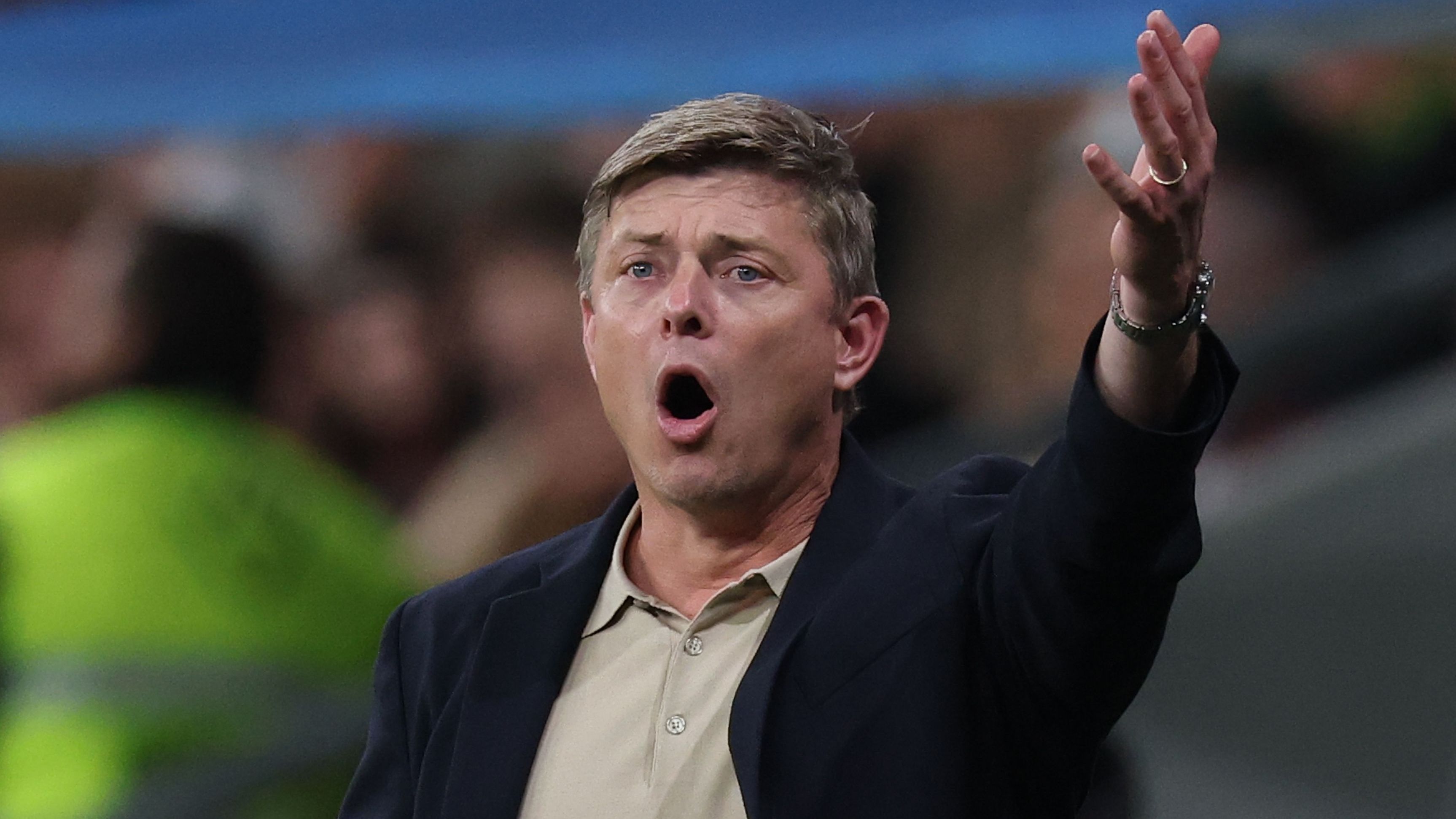


Sweden’s Stunning Setback in World Cup Qualifiers
In a display that left fans questioning the team’s direction, Sweden’s World Cup qualifying campaign hit a new low against a lower-ranked opponent. Despite fielding a talented attack featuring stars like Alexander Isak and Viktor Gyokeres, the team struggled to find their footing, resulting in a defeat that highlighted deeper issues within the squad.
Recapping the Match and Its Implications
The Swedish team, backed by an impressive frontline estimated at around £200 million and spearheaded by prominent Premier League talents, appeared lackluster and uncoordinated during the home encounter. This loss marked a repeat performance, as Kosovo-sitting at 101st in global rankings-secured a full sweep over Sweden in these qualifiers. A lone goal from Kosovo’s Fisnik Asllani in the first half sealed the deal, adding to the woes of coach Jon Dahl Tomasson’s faltering lineup. While Kosovo’s squad reveled in their triumph, Sweden’s players exited amid jeers, marking a somber moment for a nation that previously celebrated icons such as Zlatan Ibrahimović and Henrik Larsson.
Challenges Faced by Key Forwards
Expectations were high for Sweden’s leading attackers, yet Isak and Gyokeres failed to rise to the occasion once more. Isak, who shines as a Liverpool forward and is renowned for his clinical finishing in club matches, missed crucial opportunities, including a close-range header in the dying moments that was thwarted by Kosovo’s goalkeeper Arijanet Muric. Meanwhile, Gyokeres, coming off a strong campaign in Portugal, had minimal influence on the game. Together, these top-tier strikers have only netted two goals throughout the qualifiers, a disappointing tally for players held in such high esteem across Europe. Isak’s evident frustration at the end underscored yet another underwhelming outing for the team in their national colors.
Scrutiny on the Head Coach’s Leadership
Jon Dahl Tomasson, the head coach, is facing intensified criticism, with reports from local media indicating that some veteran players no longer back the ex-Blackburn Rovers manager. In his post-match comments, Tomasson, appearing distressed, declined to step down but acknowledged the severity of the situation.
Tomasson’s Post-Match Reflections
“I am committed to my agreement with the Swedish federation, especially as we continue through these qualifiers,” Tomasson stated when asked about resigning. “Naturally, this outcome falls short of expectations and represents a major disappointment. It stings deeply-we’ve lost our ability to find the net, and I’m at a loss to explain it.”
Unconventional Strategies and Player Reactions
Compounding the embarrassment, Tomasson’s unusual approach to maintaining secrecy before the match drew widespread mockery. By disclosing the starting lineup only an hour prior to the game to prevent media leaks, the 49-year-old coach reportedly caused confusion among the players. Lucas Bergvall from Tottenham, who stood out as one of Sweden’s brighter spots this season, described the tactic as odd.
“It might have occurred earlier in my professional journey,” Bergvall noted. “Personally, it didn’t affect me much, but I can’t vouch for the rest of the group.”
Debate Over Tactical Choices
Central to the team’s struggles is Tomasson’s debated playing style, which aimed to foster tight defenses and rapid shifts but has instead led to sluggish, ineffective play that saps the squad’s offensive energy. Sources from Radiosporten mentioned that Newcastle United’s Anthony Elanga, omitted from the recent matches, voiced his frustration loudly in the tunnel post-game. “We need to ditch this system!” he exclaimed, leaving his colleagues and coaching staff in shock.
In his media interaction afterward, Elanga stood by his words. “We’ve been preparing a specific formation and approach,” he explained. “Things can shift once we’re in action, though, and it’s ultimately on us out there to own our performance.”
Looking Ahead to Remaining Fixtures
As Sweden approaches their final two qualifying matches against Switzerland and Slovenia next month, their path to the play-offs appears fraught with difficulty. They’ll require flawless results and favorable outcomes elsewhere to stay in contention. Given their recent struggles, however, optimism is in short supply.
The Match That Sparked Criticism
Sweden’s recent World Cup qualifying defeat has left fans and analysts alike questioning the form of key strikers Alexander Isak and Viktor Gyokeres. In a crucial match against a formidable opponent, the Swedish national team struggled to find the back of the net, highlighting ongoing issues with their attacking play. This game, which ended in disappointment, underscored how Sweden’s inability to score has become a persistent problem in their World Cup qualifying campaign. Experts point to missed opportunities and poor finishing as the main culprits, putting Isak and Gyokeres under intense scrutiny for their roles as the team’s primary goal threats.
The defeat wasn’t just about the final score; it exposed tactical shortcomings that have plagued Sweden’s strategy. Isak, known for his pace and clinical finishing at club level with Newcastle United, appeared off the mark, while Gyokeres, who has been prolific for Sporting CP, failed to convert several chances. This has led to widespread debate in the football community about whether these players are adapting well to the international stage or if external factors like team dynamics are at play.
Analyzing Alexander Isak’s Struggles
Alexander Isak’s performance in the match has drawn particular attention, with fans and pundits alike dissecting his every move. As one of Sweden’s most promising talents, Isak’s World Cup qualifying record has been inconsistent, raising questions about his ability to perform under pressure. In this game, he had two golden opportunities that could have changed the outcome, but his shots went wide or were saved by the opposing goalkeeper.
Isak’s form isn’t isolated to this match; over the past few qualifying games, he’s only managed to score sporadically, leading to calls for more focused training on his finishing. Football analysts suggest that factors like defensive marking and the speed of international play might be contributing to his struggles. Despite his club success, where he’s often hailed as a top striker in the Premier League, Isak’s international stats show a dip in conversion rates, making him a focal point in discussions about Sweden’s attacking woes.
Viktor Gyokeres: The Rising Star Facing Pressure
Viktor Gyokeres, on the other hand, has been something of a revelation in club football, netting goals consistently for Sporting CP and drawing comparisons to elite strikers. However, in Sweden’s World Cup qualifying defeat, he too failed to make an impact, missing key chances that could have shifted the momentum. This has placed Gyokeres under scrutiny, as expectations are high for him to translate his club form to the national team.
Experts note that Gyokeres’ style, which relies on intelligent movement and precise shooting, might be hindered by the team’s overall lack of creativity in build-up play. In recent matches, Sweden’s midfield has struggled to provide the service needed for strikers like Gyokeres to thrive, leading to isolated performances. His scrutiny extends beyond this game, with fans hoping for a turnaround in upcoming qualifiers to keep Sweden’s World Cup dreams alive.
Case Studies: Similar Striker Struggles in International Football
To put Isak and Gyokeres’ situations into perspective, it’s helpful to look at case studies from other national teams. For instance, England’s Harry Kane has faced similar criticism during Euro qualifying phases, where high expectations met with underwhelming results due to tactical mismatches. In Kane’s case, adjusting his positioning and relying on better team support helped him regain form. Similarly, France’s Kylian Mbappé has dealt with scoring droughts in World Cup qualifiers, often attributing it to the physical demands of international football schedules.
These examples show that even world-class strikers experience lulls, and Sweden could learn from how teams like England turned things around. By analyzing these case studies, it’s clear that targeted coaching and strategic changes can help players like Isak and Gyokeres overcome their current challenges.
Practical Tips for Improving Striker Performance
For readers interested in football tactics or even aspiring players, there are practical tips that could address scoring issues like those seen in Sweden’s defeat. First, focus on finishing drills in training; simple exercises like one-on-one shootouts can sharpen accuracy under pressure. Coaches should also emphasize better link-up play between midfielders and strikers to create more scoring opportunities.
Additionally, mental preparation is key-strikers like Isak and Gyokeres might benefit from visualization techniques or sports psychology sessions to handle the intensity of World Cup qualifying matches. Teams can incorporate video analysis to review missed chances and identify patterns, turning defeats into learning experiences. By applying these tips, national teams can enhance their offensive capabilities and reduce scrutiny on key players.
First-Hand Experience: Insights from Football Experts
Drawing from first-hand experience shared by former players and coaches, the pressure on strikers in high-stakes games like World Cup qualifiers is immense. A retired Swedish footballer once mentioned in interviews how the weight of national expectations can lead to overthinking on the pitch, resulting in missed opportunities. This insight resonates with Isak and Gyokeres’ recent performances, where the fear of failure seemed evident.
Experts also share that building chemistry through more frequent camps and friendlies can help. For Sweden, increasing joint training sessions for Isak and Gyokeres with the midfield could foster better understanding and lead to improved scoring in future qualifiers. These real-world perspectives highlight the human element in football, making the sport more relatable and providing valuable lessons for fans and players alike.
Benefits of Addressing Scoring Issues
Addressing these scoring problems offers multiple benefits for Sweden’s team and its players. Not only could it boost their chances in World Cup qualifying, but it might also enhance individual confidence, leading to better club performances. For fans, seeing improvements could reignite passion for the national team, fostering a stronger community around Swedish football. In the long term, resolving these issues could position Sweden as a competitive force in international tournaments, benefiting the country’s football legacy.









